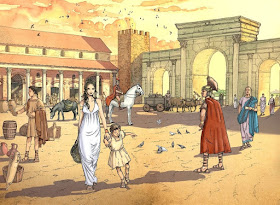In 169 BC Roman consul M. Claudius Marcellus, grandson of Marcus Claudius Marcellus, who had governed both Further and Hither Spain (Hispania Ulterior and Hispania Citerior, respectively), founded a Latin colony alongside the pre-existing Iberian settlement of Corduba.
The cities walls had been built after the Romans captured the city in 206 BC, making it part of the Roman Republic. The walls now form part of the historic center of Córdoba, a UNESCO World Heritage site. Between 143 and 141 BC the town was besieged by Viriatus. The famous Cordoba Treasure, with mixed local and Roman artistic traditions, was buried in the city at this time; it is now in the British Museum.
It became a colonia with the title Patricia, between 46 and 45 BC. It was sacked by Caesar in 45 due to its Pompeian allegiance, and resettled with veterans by Augustus. Many veterans were settled in this area (from the Sixth and Tenth legions).
It became capital of Baetica and had a colonial and provincial forum and many temples. It was the chief center of Roman intellectual life in Hispania Ulterior (Further Spain). Its republican poets were succeeded by Seneca and Lucan.
At the time of Julius Caesar, Córdoba was the capital of the Roman province of Hispania Baetica. The great Roman philosopher Seneca the Younger, his father, the orator Seneca the Elder, and his nephew, the poet Lucan came from Roman Cordoba.
In the late Roman period, its bishop Hosius was the dominant figure of the western Church throughout the earlier 4th cent. Later, it occupied an important place in the Provincia Hispaniae of the Byzantine Empire (552–572) and under the Visigoths, who conquered it in the late 6th century.
Text and picture from Facebook group Roman and Byzantine History.
Corduba Roman forum by Arturo Redondo

No comments:
Post a Comment